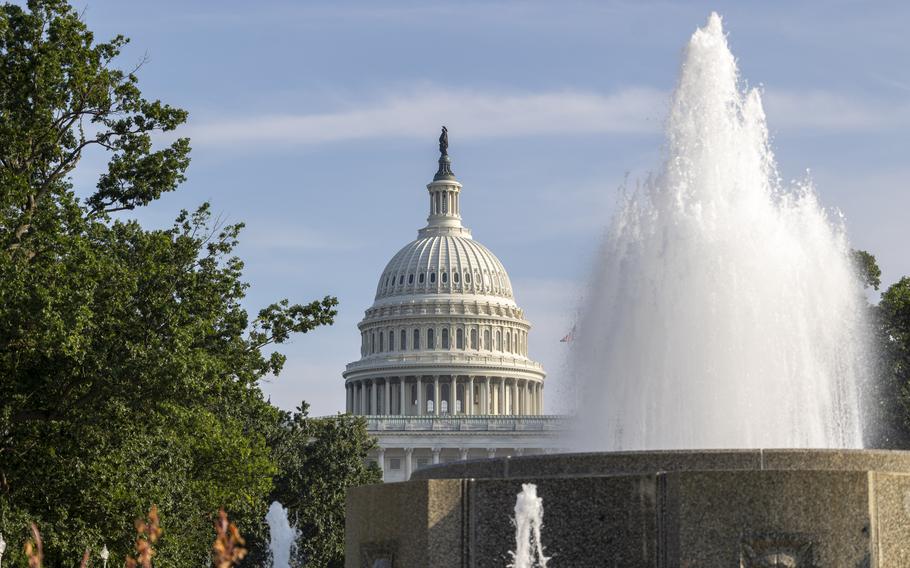
U.S. Capitol on Wednesday, July 30, 2025. (Eric Kayne/Stars and Stripes)
WASHINGTON — The Senate Appropriations Committee advanced a nearly $853 billion defense spending bill on Thursday that funds a 3.8% pay raise for troops while surging money for Ukraine and boosting the Pentagon’s budget by more than $21 billion.
The measure, passed in a 26-3 vote, pushes up the Trump administration’s budget request for the Defense Department by 2.6% and allocates $800 million for the Ukraine Security Assistance Initiative program in defiance of the administration’s request.
The Pentagon did not ask for any money for the long-running program used to purchase weapons for Ukraine’s military, but lawmakers in both chambers have written legislation resurrecting the initiative in recent weeks.
“Shutting off engagement with Ukraine would undermine our military’s efforts to prepare for the modern battlefield,” Sen. Mitch McConnell, R-Ky., the chairman of the defense appropriations subpanel, said Thursday.
The $800 million appropriated for the Ukraine initiative is the largest amount yet. The Senate Armed Services Committee is proposing $500 million for the program, and the House Armed Services Committee authorized $400 million. The House did not fund the program in the defense appropriations bill that it passed this month.
The Senate panel’s appropriations bill also restores $225 million in security assistance to the Baltic states.
“These allies are on the absolute front line of resisting Russian aggression, and we are learning critical lessons about the future of warfare, as well as standing with those who fight for freedom,” said Sen. Chris Coons of Delaware, the top Democrat on the defense appropriations subpanel.
The appropriations committee also poured funds into other priorities that senators believe are underfunded in the Pentagon’s budget request, including munitions, shipbuilding and air and missile defense.
The legislation provides a $7.3 billion increase to purchasing munitions and expanding production capacity, though a senior Senate GOP aide speaking on condition of anonymity said the investment is still not going to be enough to meet the military’s needs.
Recent operations in the Middle East, particularly the bombing of Iranian nuclear facilities last month and the sustained campaign to counter Houthi rebels in the Red Sea, have shown how quickly critical munitions can be exhausted, McConnell said.
“Given the challenges with missile stockpiles that we’re seeing in Ukraine and the Middle East, I can’t explain why the administration didn’t propose to buy every single missile it could on existing production lines and expand others,” Coons said. “But it didn’t.”
The legislation also includes $4.6 billion for air and missile defense and increases the Navy’s shipbuilding budget by $8.7 billion to complete numerous vessels under construction, advance procurement funding for additional Columbia-class and Virginia-class submarines and fund ship operations.
An effort to renovate dilapidated Marine Corps barracks received more than $1 billion.
Senators from both parties voiced frustration over how late the Defense Department submitted its budget request to Congress this year, and its decision to split the request in a way that requires two separate funding bills.
McConnell said he was glad to vote this month for the reconciliation bill that provided the Pentagon with $150 billion to help fund its budget but said it was not a “cure-all” for making long-term investments to counter China, Russia, North Korea, Iran and its proxies.
“I think not only the prior administration, but this administration as well, have underestimated the level of challenge that we have,” he said. “You’ve got authoritarian regimes coordinating with each other … and the one thing they have in common: they hate us, and they want to replace the role that America plays.”
The decision by Senate appropriators to hike defense spending by $21.7 billion brings it into conflict with the House, which largely stuck to the Trump administration’s budget request and recently passed a $831 billion defense appropriations bill.
The senior Senate GOP aide said the two chambers will need to reach an agreement in negotiations.
“We very much hope the House will move up to meet us,” the aide said. “We’re convinced that the additional $21.7 billion is of critical importance to the military. We hope the services will appreciate that, as will the White House.”
Both chambers are endorsing a 3.8% pay raise for service members, as requested by the administration.
The bill advanced by the Senate Appropriations Committee also provides “robust” child care funding as well as new investments in preventing suicide and sexual assault, said Sen. Patty Murray of Washington, the top Democrat on the panel.
“This legislation invests in our most important security asset: our brave men and women in uniform,” she said.